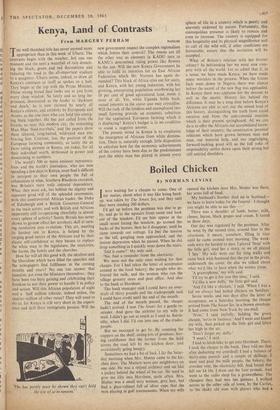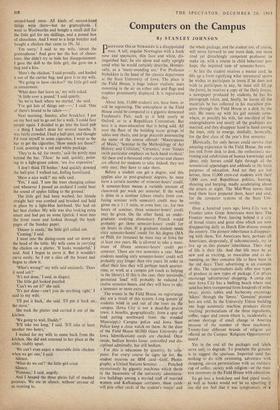Boiled Chicken
By NORMAN LEVINE I WAS waiting for a cheque to come. One of
j
my stories, about what it was like being hard- up, was taken by The Smart Set, and they said they were sending 200 dollars.
I'd get up before the postman was due to go by, and go to the upstairs front room and look out of the window. I'd see him appear in the small street facing the window, go around the backs of the houses, then he'd disappear, until he came towards our cottage. I'd feel the tension as the tall, gangling man approached; and the instant depression when he passed. When he did drop something in I quickly went down the stairs.
`Did it come?' My wife said.
`No. Just a reminder from the electricity.'
We were not the only ones waiting for that cheque. For I had taken the letter of acceptance around to the local bakery, the people who de- livered the milk, and the woman who ran the village grocery store and post office. And also to the bank at Horsham.
The bank manager said I could have an over- draft of thirty pounds and the tradespeople said I could have credit until the end of the month.
The end of the month passed, the cheque hadn't arrived. I sent The Smart Set a gentle re- minder. And gave the airletter to my wife to mail. I didn't go out as much as I used to. Inevit- ably, when I did, I'd run into one of the trades- people.
But we managed to get by. By counting the coppers on the shelf; eating lots of potatoes; hav- ing cauliflower that the farmer from the field across the road left by the kitchen door; and occasionally going hungry.
Sometimes we had a bit of luck. Like the Satur- day morning when Mrs. Mutter came to the kit- chen door. The Mutters were our neighbours on one side. He was a retired architect and sat like a jockey behind the wheel of his car. He used to give me lifts into Horsham, quite often. Mrs. Mutter was a small wiry woman, grey hair, but had a glass-cabinet full of silver cups that she won playing in golf tournaments. When my wife opened the kitchen door Mrs. Mutter was there, her arms full of food.
'My husband's brother died up in Scotland— we have to leave today for the funeral—I thought you might be able to use this ' There was a shoulder of lamb, butter, milk, cheese, bacon, black grapes and cream. It lasted us three days.
Our day was regulated by the postman. After he went by the second -time, around four in the afternoon, it meant, somehow, filling in time until he came around next morning. The week- ends were the hardest to pass. I played 'Snap' with the little girl, read her a story, or we all played 'I Spy.' My wife went out for long walks and came back with firewood that she put in the pram, underneath the cover. Or else we talked about what we'd like to have when the money came.
'A gramophone,' my wife said.
'I'll try to get it for you this time,' .I said.
'I'd like a new dolly,' the little girl said.
'And I'd like a chicken,' I said. 'When I was a kid we always had boiled chicken on Sundays.'
Seven weeks and two days after the letter of acceptance, on a Saturday morning, the cheque arrived from The Smart Set, in a brown envelope. It had come from New York by sea-mail.
'Now,' 1 said joyfully, holding the green cheque, 'we're in business.' And I went and kissed my wife, then picked up the little girl and lifted her high in the air.
`Don't forget my dolly.'
'I won't,' I said.
I had to hitch-hike to get into Horsham. There, I took the cheque to the bank. They told me that after deducting my overdraft 1 had a balance of thirty-nine pounds and a couple of shillings. I went and paid the milk people, the bakery, the overdue rent, the electricity bill. And found that left me £4 10s. 1 drew out the four pounds. And went to the radio shop for a gramophone. The cheapest they had was ten guineas. I walked across to the other side of town, by the Carfax, to' the shaky old mart with glasses who had a second-hand store. All kinds of second-hand things were there—but no gramophone. I went to Woolworths and bought a small doll for the little girl for ten shillings, and a pound box of chocolates. And I went to a large butcher and
bought a chicken that came to 19s. 3d. • `I'm sorry,' I said to my wife, 'about the gramophone.' And gave her the box of choco- lates. She didn't try to hide her disappointment. I gave the doll to the little girl, she gave me a hug and a kiss.
'Here's the chicken,' I said proudly, and hauled it out of the carrier bag, and gave it to my wife.
`We going to have chicken?' the little girl said in amazement.
`What does that leave us,' my wife asked. 'A little over a pound,' I said quietly.
`So we're back where we started,' she said. 'I've got lots of things out—,' I said. 'One of them's bound to be taken—.'
Next morning, Sunday, after breakfast, I put on my best suit to go out for a walk. I could face people again. I decided to go into the local pub - a thing I hadn't done for several months. It was fairly crowded. I had a half-pint, and thought I'd treat myself to some cigarettes. I went to the bar to get the cigarettes. 'How much are those?' I said, pointing to a red and white package.
'They're 4s. 6d. for twenty,' said the portly man behind the bar. 'These,' he said, quickly, point- ing to a light-green colour, 'are less expensive.'
'I don't think I'll bother.' And quickly downed the half-pint. I walked out, feeling humiliated.
`Have a nice walk?' my wife said.
'Yes,' I said. 'I saw the trees changing coloui- and whenever I passed an orchard I could hear the sound of apples falling to the ground.'
The little girl had been washed, her blonde straight hair was combed and brushed and held in place by a light-blue hairband. She had on her best clothes. My wife was also looking extra smart and had put on some lipstick. I went into the front room and looked through the book pages of the Sunday paper.
'Dinner is ready,' the little girl called out. 'Coming,' I said.
I went into the dining-room and sat down at the head of the table. My wife came in carrying the chicken on a platter. 'It looks wonderful,' I said. And I began to carve it. But it wouldn't carve easily. So I cut a slice off the breast and began to chew it.
`What's wrong?' my wife said anxiously. 'Does it need salt?'
`It's not done,' I said, in disgust.
The little girl looked puzzled.
'Can't we eat it?' she said.
'It's not done—can't you do anything light,' I said to my wife.•
4111 put it back,' she said. 'I'll put it back on the stove.'
She took the platter and carried it out of the kitchen.
'We going to wait, Daddy?'
`It'll take too long,' I said. 'It'll, take at least another two hours,'
I waited for my wife to come back from the kitchen. She did and returned to her place at the table, visibly upset.
'We can't even enjoy a miserable little chicken when we get one,' I said.
Silence.
'What do we eat?' the little girl cried.
Silence.
'Potatoes,' I said, angrily.
And I heaped the three plates full of mashed potatoes. We ate in silence, without anyone of us wanting to.































 Previous page
Previous page